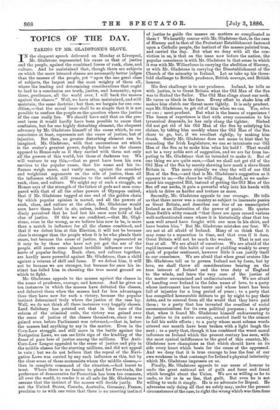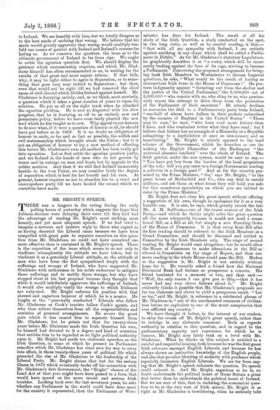TOPICS OF THE DAY.
TAKING UP MR. GLADSTONE'S GLOVE.
TN the eloquent speech delivered on Monday at Liverpool, Mr. Gladstone represented his cause as that of justice and the people, against the combined forces of rank, class, and culture. And he maintained that, though there are subjects on which the more leisured classes are necessarily better judges than the masses of the people, yet " upon the one great class of subjects, the largest and the most weighty of them all, where the leading and determining considerations that ought to lead to a conclusion are truth, justice, and humanity, upon these, gentlemen, all the world over, I will back the masses against the classes." Well, we have often maintained, and still maintain, the same doctrine; but then, we bargain for one con- dition,—that the moral issue shall be so simple that it is not possible to confuse the people on the question where the justice of the case really lies. We should have said that on the pre- sent issue it would hardly have been possible to cause that confusion, but for one highly disturbing element, the eloquent advocacy by Mr. Gladstone himself of the cause which, to our conscience at least, represents not the cause of justice, but of injustice. But then, no greater disturbing element can be imagined. Mr. Gladstone, with that unconscious art which is the orator's greatest power, deploys before us the classes opposed to Home-rule as if they carried with them not only all the powers of this world, but those of darkness too. We will venture to say this,—that so great have been his own services to the popular cause, that his name and his in- fluence weigh more, and vastly more, against the soundest and weightiest arguments on the side of justice, than all the influence which still remains to the united strength of rank, class, and culture. We might say of such a struggle, as Homer says of the strength of the father of gods and men com- pared with that of all the other powers of Olympus united, that if Mr. Gladstone tugged at one end of the golden chain by which popular opinion is moved, and all the powers of rank, class, and culture at the other, Mr. Gladstone would soon have them hoist in air, unless, indeed, the people had dimly perceived that he had lost his once sure hold of the clue of justice. Of this we are confident,—that Mr. Gla.d- stone, even in the wrong, as we believe him now to be, is more than a match in influence for all the classes combined, and that if we defeat him at this Election, it will not be because class is stronger than the people when it is he who pleads their cause, but because the cause of justice, feebly represented as it may be by those who have not yet got the ear of the people, still exerts some almost invisible influence over the nerve of popular feeling. Rank, class, and culture together, are hardly more powerful against Mr. Gladstone, than a child against a veteran of skill and fame. If we defeat him, it will not be because we are stronger, but because for once his in- stinct has failed him in choosing the true moral ground on which to fight.
Mr. Gladstone appeals to the masses against the classes in the name of prudence, courage, and honour. And he gives us ten instances in which the masses have defeated the classes, and defeated them when the masses had far less advantages than they have now for such a victory, because the popular instinct determined truly where the justice of the case lay. Well, we do not think all these instances very happily chosen. Lord Salisbury has pointed out that in the case of the reform of the criminal code, the victory was gained over the sense of justice of the classes themselves, since it was gained even before Parliament was reformed,—that is, before the masses had anything to say in the matter. Even in the Corn-Law struggle, and still more in the battle against the Navigation Laws, we can see little sign of the kindling of the flame of pure love of justice among the millions. The Anti- Corn-Law League appealed to the sense of justice and pity in the middle classes for the starving millions, and did not appeal in vain ; but we do not believe that the repeal of the Navi- gation Laws was carried by any such influence as this, but by the clear sense of those economists whom the middle classes,— then in complete command of the situation,—had learnt to trust. Where there is no famine to plead for Free-trade, the preference of democracies for Protection has been too common, all over the world, to render it at all safe for Mr. Gladstone to assume that the instinct of the masses will decide justly. Do not the United States, Canada, Australia, Germany, France, proclaim to us with one voice that there is no unerring instinct of justice to guide the masses on matters so complicated as these We heartily concur with Mr. Gladstone that, in the case of Slavery and in that of the Protestant Establishment fastened upon a Catholic people, the instinct of the masses pointed true, and carried the day. But what we deny with all the con- viction in us, is that on the issue now before the nation, the popular conscience is with Mr. Gladstone in that sense in which it was with Mr. Wilberforce in carrying the abolition of Slavery, or with Mr. Gladstone in carrying the Disestablishment of the Church of the minority in Ireland. Let us take up his three- fold challenge to British prudence, British courage, and British honour.
His first challenge is to our prudence. Ireland, he tells us with justice, is to Great Britain what the Old Man of the Sea was to Sinbad the Sailor. The Old Man clings about our neck. He turns us black in the face. Every effort to shake him off makes him clutch our throat more tightly. It is only prudent, says Mr. Gladstone, to get rid of him when we can. Yes, when we can ; most prudent. But what is the lesson of experience ? The lesson of experience is that with every concession to his tyrannical demands, he has only clung the tighter. Sinbad did not get rid of his Old Man of the Sea by satisfying his claims, by taking him meekly where the Old Man of the Sea chose to go, but, if we recollect rightly, by making him drunk. Surely Mr. Gladstone does not mean to hint that by conceding the Irish Legislature, we can so intoxicate our Old Man of the Sea as to make him relax his hold ? That would not be a very noble sort of suggestion, and we are far from im- puting to Mr. Gladstone that he intended to make it. But of one thing we are quite sure,—that we shall not get rid of the Old Man of the Sea by merely showing how meek a slave Great Britain is. The more abjectly we obey the will of our Old Man of the Sea,—and that is Mr. Gladstone's suggestion as it appears to us,—the closer he will cling. Indeed, as we under- stand his suggested Bill, instead of getting the Old Man of the Sea off our necks, it puts a powerful whip into his hands with which to drive us harder and torture us more.
Secondly, Mr. Gladstone appeals to our courage. He tells us that there never was a country so subject to insensate panics as Great Britain, and describes our fear of an emancipated Ireland as an illustration of the power of panic. He quotes Dean Swift's witty remark "that there are upon record various well-authenticated cases where it is historically clear that ten men well armed have fought with one man in his shirt, and have beaten him." But Mr. Gladstone mistakes our fear. We are not at all afraid of Ireland. Many of us think that it may come to a separation in time, and that even if it does, Great Britain will not be much the weaker. That is not our fear at all. We are afraid of ourselves. We are afraid of the rapid increase of this habit of ours of yielding weakly to every gush of popular sentiment, however little it can justify itself to our conscience. We are afraid that when great orators like Mr. Gladstone tell us to govern Ireland not by force, but by love, we shall throw all considerations bearing on the true interest of Ireland and the true duty of England to the winds, and leave the very core of the justice of the matter unexamined and undiscriminated. We are afraid of handing over Ireland in the false name of love, to a party whose instrument has been terror and whose heart has been full of injustice for a long period of years ; to a party that has compelled honourable debtors to go by night to pay their debts, and to conceal from all the world that they have paid them ; to a party that has invented the cruellest of social excommunications for its own political purposes ; to a party that, when it found Mr. Gladstone himself endeavouring to do justice to its native country, exerted itself to the utmost to foil his noble efforts ; to a party whose most solemn words uttered one month have been broken with a light laugh the next ; to a party that, though it has combined the worst moral influence on Ireland which the present century has seen, with the most cynical indifference to the good of this country, Mr. Gladstone now champions as that which should have on its side every heart which beats for the cause of the oppressed. And we deny that it is true courage to lose the fear of our own weakness in that contempt for Ireland's physical inferiority which Mr. Gladstone impresses on us. Finally, Mr. Gladstone appeals to our sense of .honour to undo the great national act of guilt and force and fraud which brought about the Union. We are as willing as he to undo, so far as in us lies, that guilt. But even he is not willing to undo it simply. He is no advocate for Repeal. He advocates only doing all that we safely may, under the present circumstances of the case, to right the wrong which was then done



































 Previous page
Previous page